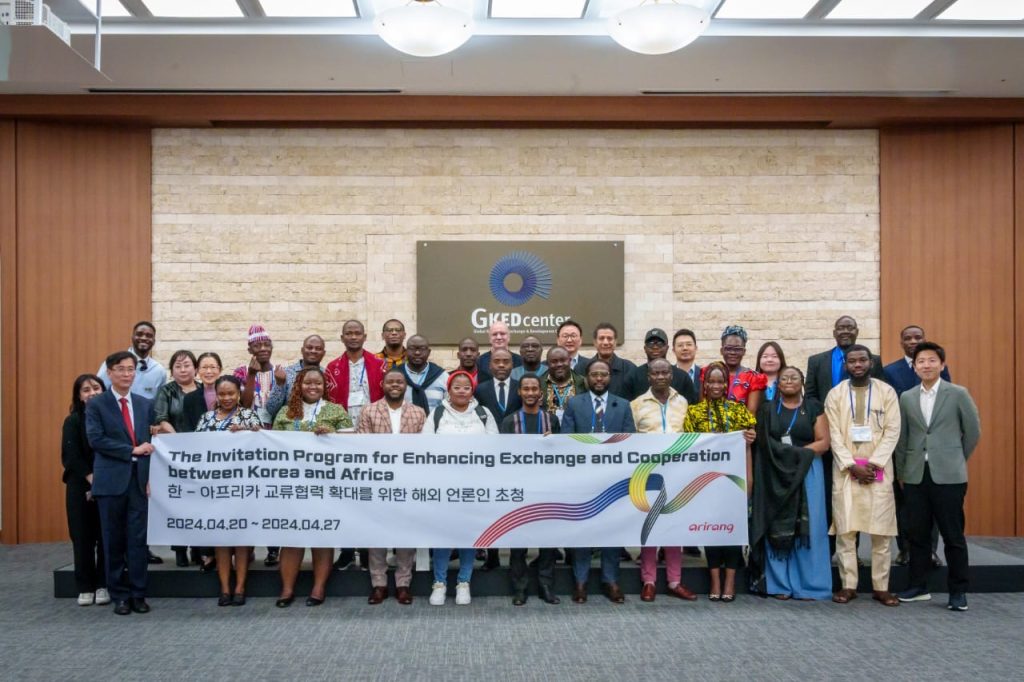In preparation for the inaugural Korea-Africa Summit, journalists from Africa were invited to get prior insight on what the summit would bring as South Korea is set to host the historic event on June 4-5, 2024, under the theme “The Future We Create Together: Shared Growth, Sustainability, and Solidarity.” This summit aims to bring together numerous heads of state and key stakeholders to foster a strong partnership between Korea and African nations.
The summit promises to promote economic cooperation, sustainable development, and mutual growth, leveraging the respective strengths of both parties. South Korea’s remarkable economic growth, often referred to as the “Korean Miracle,” was achieved through collective efforts and careful utilization of international aid. Now, Korea is committed to giving back and assisting African countries in their development journey.
The upcoming summit is a demonstration of this commitment, focusing on outcome-oriented discussions and collaborations that ensure lasting prosperity for both parties. Key priorities include boosting trade and investment, food security, sustainable energy and infrastructure, science and technology, mutual peace and understanding, and peace and security.
In agriculture, which is key to growth in many African countries, the Summit plans to launch the “K-Rice Belt Initiative”, a programme designed to help eight African countries achieve self-sufficiency in rice production by 2027. In addition to this KRB Initiative, there is also the Korea Partnership for Innovation of Agriculture (KOPIA), which is aimed at providing technical expertise and equipment to many African experts.
Korea-Africa Agri-Food Technical Cooperation Council (KAFACI), this program was launched in 2010 was designed to promote sustainable agricultural productivity improvement projects such as reducing hunger and poverty in Africa through technology development to solve current issues like enhancing food production, with 23 member states benefiting already from this program, KAFACI aims to hit more milestones.
South Korea equally wants to foster closer cultural ties with many African countries. This is why it is trying to engage in a public diplomacy where the Korea Foundation (KOF) is promoting Korea studies and language, establishing a global network, and engaging in cultural and art sectors to enhance understanding of Korean culture.
For Africa, beyond mutual collaboration, there are a lot of lessons to learn from South Korea, which managed to maintain economic growth rates of more than 7 percent for 30 years, courtesy of rapid industrialization and increased exports. The biggest dilemma facing many African countries is how to reach higher levels of economic growth and maintain them for the long run in an international economic environment, which is constantly changing.
During the visit, we witnessed a seamless blend of cutting-edge technology and rich cultural heritage that collectively contributes to the nation’s development. Also, Hyundai’s global presence has enhanced South Korea’s international image, promoting it as a nation capable of producing high-quality and unique products. This has fostered a sense of national pride and has contributed to the growth of South Korea.
The Korea-Africa Summit is a significant step towards strengthening ties and creating a brighter future for both parties. This upcoming summit reflects the equal partnership that South Korea and Africa intend to add to their existing strong cooperation as both parties advance their respective agendas for the future. For South Korea, it has a vision to become a “global pivotal state.” Africa, on its part, wants to accelerate development across the continent. Working together, South Korea and Africa can help each other achieve these goals.

